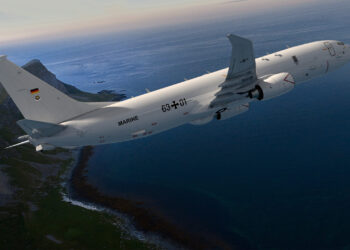Agence France-Presse,
CARACAS: Russian warships were to arrive in Venezuela Tuesday for joint maneuvers — Moscow's first military presence in the region since the Cold War, as Washington closely monitored the situation.
“They're not a provocation but an exchange” between “two free, sovereign countries that are getting closer,” Venezuelan President Hugo Chavez said in a news conference late Monday.
“We carried out maneuvers with Brazil recently, with France, with the Netherlands and now with Russia.”
The joint exercises were to coincide with a two-day visit by Russian President Dmitry Medvedev to Venezuela, the strongest US critic in the region.
Analysts see Medvedev as bringing a defiant message to Washington's doorstep, in the wake of Russian outrage at US plans to install a strategic missile shield in Poland and the Czech Republic, and support for the brief Georgia war in August.
Venezuelan defense officials said the ships, including the nuclear-powered cruiser Peter the Great and destroyer Admiral Chabankenko, would arrive early Tuesday.
Medvedev was due to arrive Wednesday and meet fiercely anti-American president Chavez on Thursday, before heading to communist Cuba.
The maneuvers will start on Wednesday in port and take place at sea on December 1, Venezuelan Operations Command chief General Jesus Gonzalez told reporters Monday.
A Russian naval spokesman said in Moscow that the exercises would include operation planning, helping ships in distress and supplying ships on the move.
“If the Venezuelans and the Russians want to have, you know, a military exercise, that's fine, but we'll obviously be watching it very closely,” US State Department spokesman Sean McCormack said Monday.
“I don't think there's any question about who … the region looks to in terms of political, economic, diplomatic and as well as military power,” McCormack added.
The US has expressed concern, however, about Russian arms supplies to the oil-rich OPEC country.
The two countries have signed 4.4 billion dollars in bilateral arms deals since 2005, including radars, 24 Sukhoi-30 planes, 50 helicopters and 100,000 Kalashnikovs.
Medvedev was expected to expand arms deals during his visit, as well as economic and energy ties, including plans for a joint civilian nuclear reactor.
“Russia is a friend which held out a hand to us,” Gonzalez told AFP in a recent interview.
“We want to be very strong, but in a highly dissuasive direction. So that any country in the world thinks not once but 10 times before coming here.”
In September, two Tu-160 Russian strategic bombers carried out training for several days in Venezuela.
The Russian warships were due to sail into La Guaira, near Caracas, and Puerto Cabello in northern Carabobo state.
“Until a few years ago, we did a lot of maneuvers with the United States. Now we don't do maneuvers with the United States, of course. We got out of that defense system and we're creating our own system of defense,” Chavez said Monday.
The fleet includes five aircraft and several small ships, and Venezuela will provide eight aircraft and 11 ships, Gonzalez said Monday, adding that 1,150 Russian forces and 600 Venezuelans would take part in the exercises.
“Nations frequently exercise with each other. Russia is free to exercise peacefully with anyone that they want to exercise with,” Pentagon spokesman Bryan Whitman said Monday.
“But also people note through these exercises the company that nations keep.”









